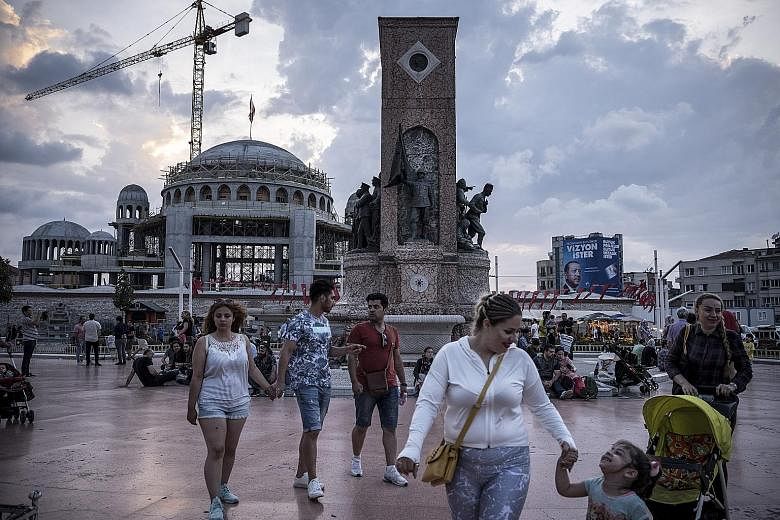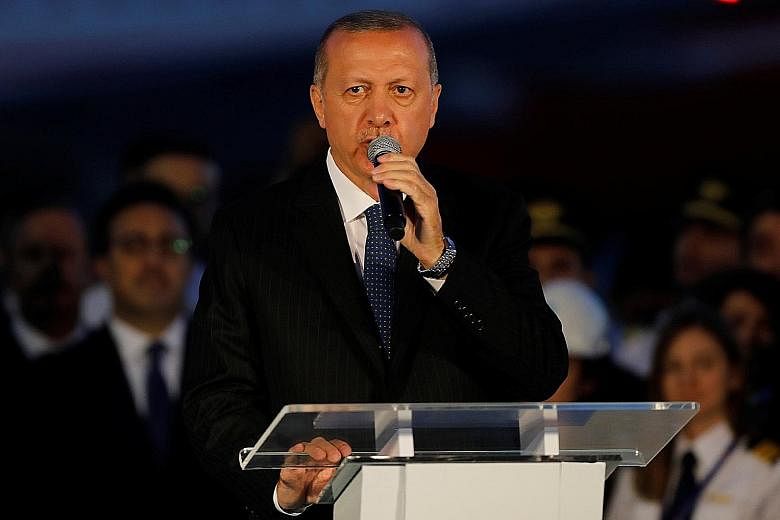ANKARA • From soaring bridges to a giant mosque to plans for the world's biggest airport, Turkish President Recep Tayyip Erdogan has used gargantuan building projects as an engine of growth and a signature way of leaving an indelible stamp on his nation.
As he campaigns for re-election tomorrow, Mr Erdogan has promised his most ambitious project yet: a canal that would bisect the country and create a Turkish-owned trade route, which he says would make Turkey a great power and leave a legacy for the history books.
"What makes Panama is the Panama Canal," he told supporters in Istanbul last weekend. "Suez is the biggest source of revenue for Egypt. Let's have a vote. God willing, the Istanbul Canal will be another fresh breath for our city."
The election is shaping up as an up-or-down vote on how Mr Erdogan has transformed Turkey during the 15 years that he has been in charge - as prime minister from 2003 to 2014, and as president over the last four years.
There are signs that the public is weary of his building mania.
The canal is the latest dividing line between those who see Mr Erdogan's projects as visionary, and those who say the works are guided by an insatiable construction industry that has enriched his ruling circle, raising questions about his management of a faltering economy.
Mr Erdogan called the election 11/2 years ahead of schedule, hoping to beat the economic downturn nipping at his heels.
A once-fractured opposition has united against him, making it increasingly uncertain whether he will meet the 50 per cent threshold to win outright and avoid a run-off against his top challenger.
All of Mr Erdogan's mega projects have been about creating symbols of his strength as he aims for a place in the pantheon of great Turkish leaders, from the Ottoman sultans to the founder of the republic, Mustafa Kemal Ataturk.
The 45km canal linking the Black Sea to the Sea of Marmara - estimated to cost US$15 billion (S$20.3 billion), though critics say the figure is closer to US$65 billion - has been dubbed Mr Erdogan's "crazy idea" since he conceived it seven years ago.
"It means crazy, wow, in a good sense," said Mr Mehmet Akarca, head of Turkey's general directorate for press and information. "It will make money, and ships will use it, and they will pay tolls to use it."
But many doubt whether it will ever happen - or whether it will work if it does.
Environmentalists warn that the canal would damage the ecosystem so much that Istanbul could become uninhabitable. Archaeologists caution that it would threaten a top-class Paleolithic site. Economists say the project is not financially viable.
In its report, Istanbul's Chamber of Environmental Engineers said the canal project - which includes plans for a new city for as many as three million people - would cause irreversible harm.
"In the long run, we will lose the Sea of Marmara and do damage to the Black Sea," said Mr Sedat Durel, an environmental engineer who worked on the report. He estimated that as many as 800,000 people would be displaced.
While the building spree has generated growth, opponents of the President say his economic model is dubious, even corrupt.
Mr Abdullatif Sener, a former deputy prime minister, has alleged that Mr Erdogan's way of governing is all about the profit that the President and his close circle can gain in kickbacks.
Residents have pushed back against projects that have favoured construction magnates, most prominently at the central Taksim Square, where huge protests exploded in May 2013 to prevent commercial developers building on it.
The protests, which left eight people dead and hundreds more injured, drew many citizens to oppose Mr Erdogan's headlong drive to modernise Turkey's cities.
Yet instead of listening to them, Mr Erdogan doubled down on his projects.
Last month, Istanbul's cultural centre, an emblem of Ataturk's openness to the West, was pulled down at the site, and a vast domed mosque raised opposite it, dwarfing Ataturk's statue.
NYTIMES


